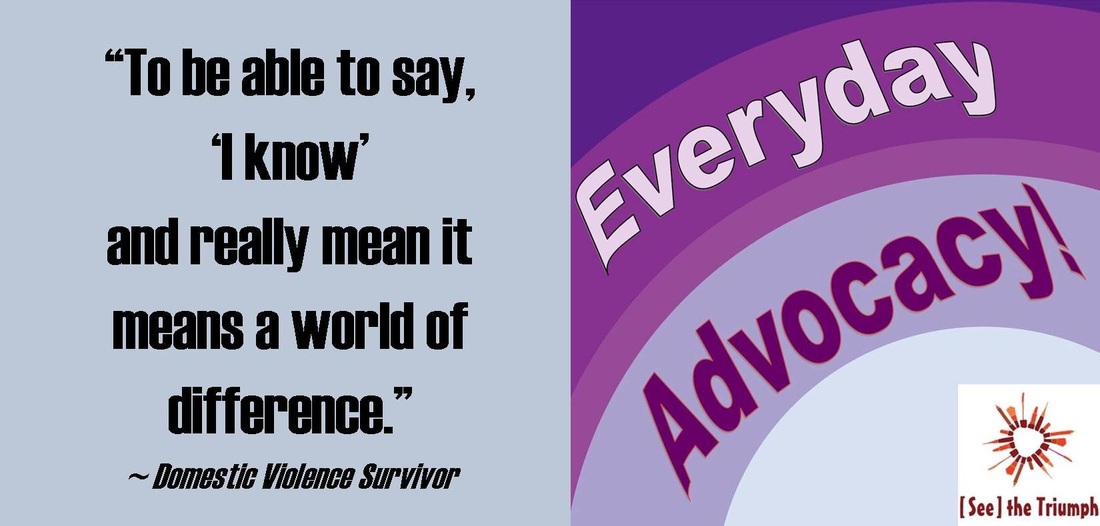|
By Christine Murray, See the Triumph Co-Founder
In our original research that led us to begin the See the Triumph campaign, some participants described how they were motivated to use their past experiences with abuse to become an advocate to helping others who have been abused. As we’re addressing throughout our series this month, being an advocate means different things to different people, and it could come in the form of paid and/or volunteer work with victims/survivors of domestic violence, providing support through a community or religious organization, writing letters to the editor, speaking about their experiences with others in the community, and other formal and informal forms of advocacy. We’ve recently been collecting data for a new study, and one of the questions we’ve asked participants is, “To what extent do you view yourself as an advocate?” So far, we’ve gotten some really great and insightful responses to that question, and in a series of blog posts over the coming weeks, we’ll share some of the initial feedback we’ve received from the participants who’ve completed the survey so far. Today, I’ll highlight the important and valuable voice that survivors bring to advocacy work to address intimate partner violence (IPV). Now, I believe strongly that everyone can be an advocate to raise awareness about IPV and the stigma that surrounds it, provide support to survivors, and hold offenders accountable. Ideally, every person in the would get behind this cause, whether or not they have any personal experience with abuse. I believe that all should be welcomed to this important table. However, survivors’ voices, experiences, and perspectives are especially important to advocacy efforts to address IPV at both the individual and societal levels. Of course, nobody should be forced to share their story, either publicly or anonymously, unless they feel completely comfortable and safe in doing so. I’ll address the importance of survivors choosing whether or not to engage in advocacy work in the next blog post in this series. When survivors share their stories as part of advocacy efforts, they bring a powerful voice and important perspective that can both help to educate the general public and provide support and inspiration to survivors. The following quotes from participants in our research--all survivors who had been out of any abusive relationships for at least two years--demonstrate the importance of this perspective:
Survivors’ stories provide powerful reminders of the horrific abuse that many people experience, and yet they also illustrate the triumph and strength that people show when they overcome abuse. Therefore, advocacy efforts to address IPV should honor survivors’ lived experiences, as these are at the core of the reasons why advocacy work is so important. Comments are closed.
|
Archives
July 2024
CategoriesAll About Intimate Partner Violence About Intimate Partner Violence Advocacy Ambassadors Children Churches College Campuses Cultural Issues Domestic Violence Awareness Month Financial Recovery How To Help A Friend Human Rights Human-rights Immigrants International Media Overcoming Past Abuse Overcoming-past-abuse Parenting Prevention Resources For Survivors Safe Relationships Following Abuse Schools Selfcare Self-care Sexual Assault Sexuality Social Justice Social-justice Stigma Supporting Survivors Survivor Quotes Survivor-quotes Survivor Stories Teen Dating Violence Trafficking Transformative-approaches |
Search by typing & pressing enter



 RSS Feed
RSS Feed